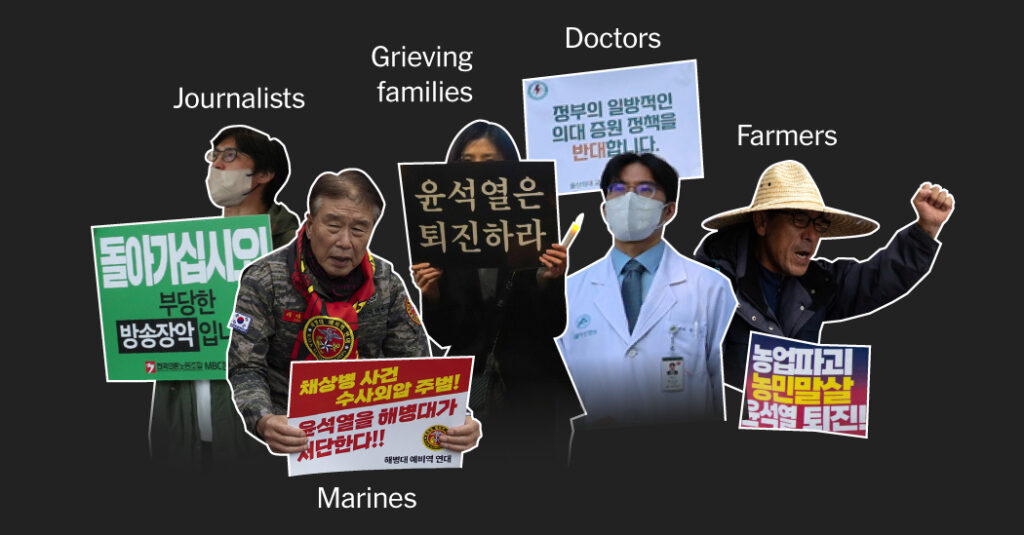Angry rice farmers. Striking doctors. A $2,200 Dior bag.
South Korea’s president, Yoon Suk Yeol, may have sealed his political fate on Dec. 3 when he declared martial law, triggering public outrage. On Saturday, the National Assembly voted to impeach Mr. Yoon, who then was suspended from office.
Even before Mr. Yoon’s brief imposition of military rule, a series of scandals and unpopular decisions since he took office had left him with some of the lowest approval ratings in South Korea’s history.
After Saturday’s vote, the Constitutional Court will decide Mr. Yoon’s fate, a process that could take months. But even before the vote, he faced angry voters, who were upset at his leadership amid growing inequality, rising prices and escalating threats from North Korea.
Here’s how Mr. Yoon lost the trust of much of his electorate.
March
Mr. Yoon was voted into office by the thinnest margin since South Korea began holding free presidential elections in 1987. Within days, he announced a controversial plan to relocate the Defense Ministry so his office could move into its compound, at a cost to taxpayers of about $41 million.
May
Weeks into Mr. Yoon’s term, two of his cabinet nominees withdrew after being accused of nepotism. Three more would resign within months.
September
A media outlet published a recording of Mr. Yoon apparently using an expletive to refer to U.S. lawmakers after a meeting with President Biden. Mr. Yoon called the report “fake news,” and members of his party tried to enter the broadcaster’s offices. Mr. Yoon has repeatedly gone after journalists and news organizations that criticized him, leading to accusations of censorship and backsliding on democratic values.
October
Halloween celebrations in Itaewon, a lively Seoul neighborhood, turned into disaster when 159 young people were killed in a crowd crush. Grieving families were furious at the government. Records showed that the authorities had missed several opportunities to prevent such a catastrophe. But the government insisted it had not been responsible for public safety that night because the festivities were not an official event. Mr. Yoon blamed officers in the field and refused to apologize.
March
Pushing to mend ties with Tokyo, Mr. Yoon announced that his government would no longer seek compensation from Japan for subjecting Koreans to forced labor during World War II, saying it would instead pay the victims itself. Mr. Biden praised the deal, but critics at home cast the decision as a surrender to South Korea’s former colonizer.
April
Citing concerns about overproduction, Mr. Yoon vetoed a bill that would have required the government to buy surplus rice to stabilize prices. Farmers have since taken to the streets to demand the bill’s return.
May
Tens of thousands of nurses went on strike after Mr. Yoon vetoed legislation meant to improve their pay and working conditions. Mr. Yoon pointed to reservations that doctors and nursing assistants had expressed about the bill.
August
Mr. Yoon’s endorsement of nearby Japan’s plan to discharge treated radioactive wastewater from the destroyed Fukushima nuclear plant set off a public backlash.
November
Video taken with a hidden camera showed Mr. Yoon’s wife, Kim Keon Hee, accepting an expensive Dior pouch. She had been accused of questionable financial dealings before Mr. Yoon took office. Lawmakers passed a bill requiring an investigation into the claims, but Mr. Yoon vetoed it, denying that his wife had done anything wrong.
December
Mr. Yoon vetoed a union-backed bill that would have limited companies’ ability to sue workers for losses during strikes. With wages stagnant, metal workers, who are vital to South Korea’s automobile and shipbuilding industries, had been protesting the government’s labor policies for months.
February
Trainee doctors walked off the job, demanding better pay and working conditions and protesting Mr. Yoon’s plan to dramatically increase medical school enrollment. Some senior doctors soon decided to join the strike for one day a week. Many patients blamed the disruptions on the president’s unwillingness to compromise.
April
In parliamentary elections, voters gave the opposition 187 of the National Assembly’s 300 seats, one of the largest majorities in decades. The results were widely seen as a verdict on Mr. Yoon, and his approval rating hit a new low: 23 percent.
May
Mr. Yoon vetoed a bill calling for a special investigation into the death of a marine and its aftermath. The marine died in 2023 while on a mission to rescue flood victims; it was later revealed that his team had not been given life jackets. An officer who investigated the case accused Mr. Yoon of pressuring the Defense Ministry to whitewash the matter.
November
Demanding wage protections, the country’s largest trade union organizer announced plans for tens of thousands of railway, subway and school workers to strike during the first week of December.
Dec. 3
Mr. Yoon declared martial law — but he withdrew the order six hours later, after lawmakers rushed to the National Assembly and voted to rescind it.
Last weekend, just before lawmakers tried to impeach him the first time, Mr. Yoon apologized to the people for declaring martial law. His party hinted that he might step down.
But in a speech televised on Thursday, Mr. Yoon said his decree had been necessary to “save the country” from “anti-state” opposition parties, and he vowed to “fight to the end.”
A person wearing a Yoon Suk Yeol mask danced in front of the National Assembly building after martial law was rescinded, as the police began to open the streets.
Chang W. Lee/The New York Times
https://www.nytimes.com/interactive/2024/12/14/world/asia/skorea-yoon-timeline.html


